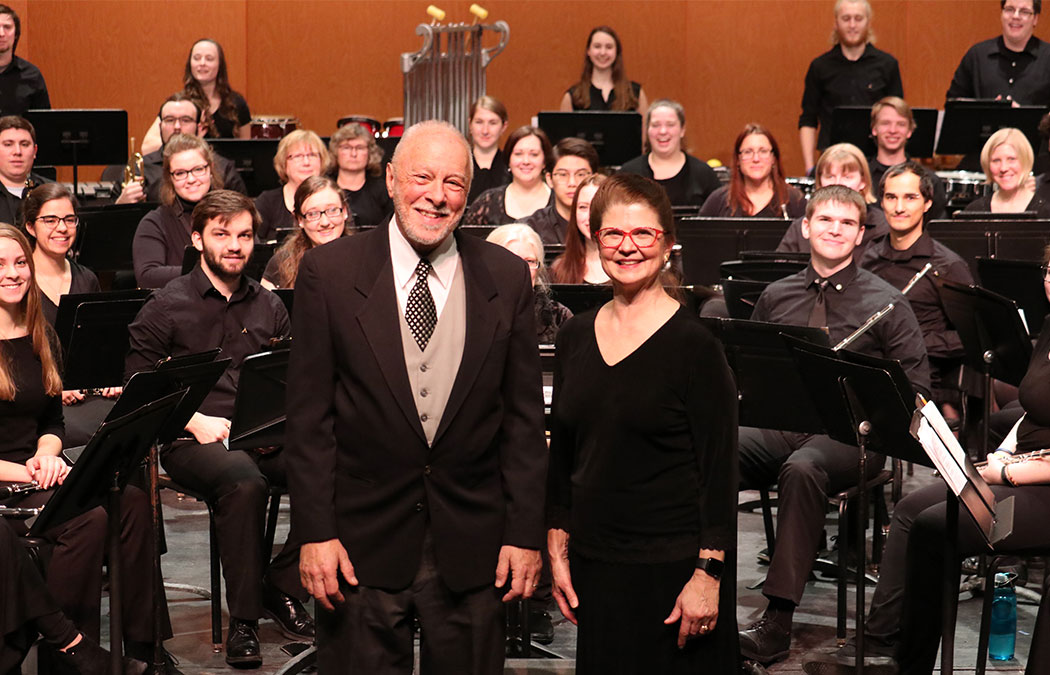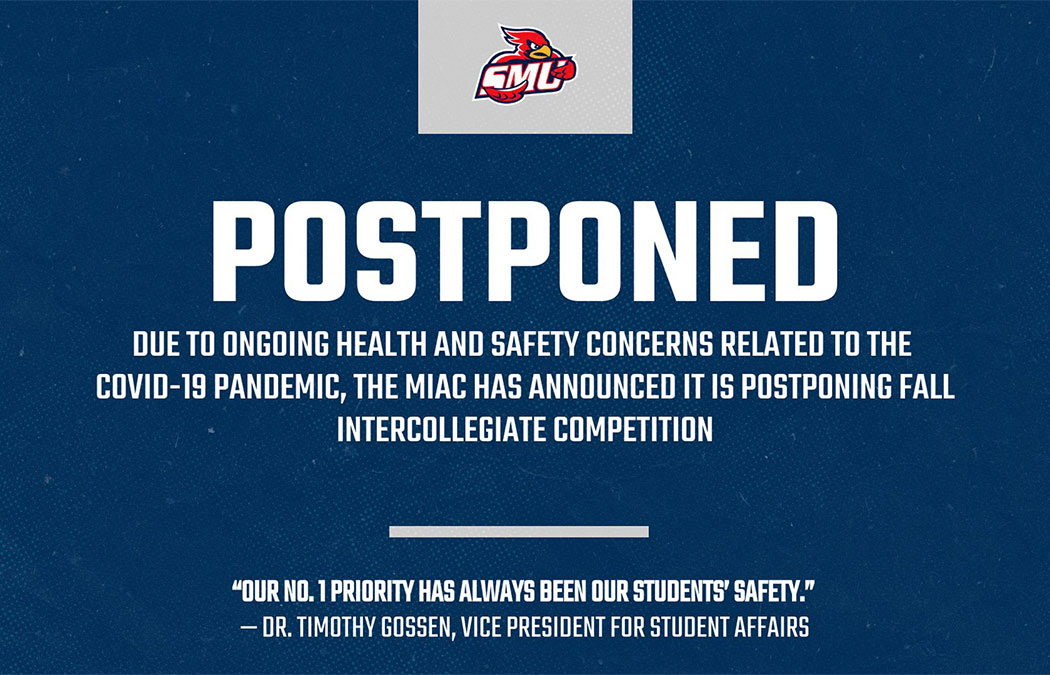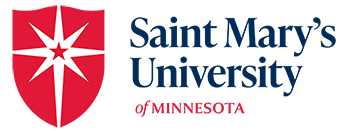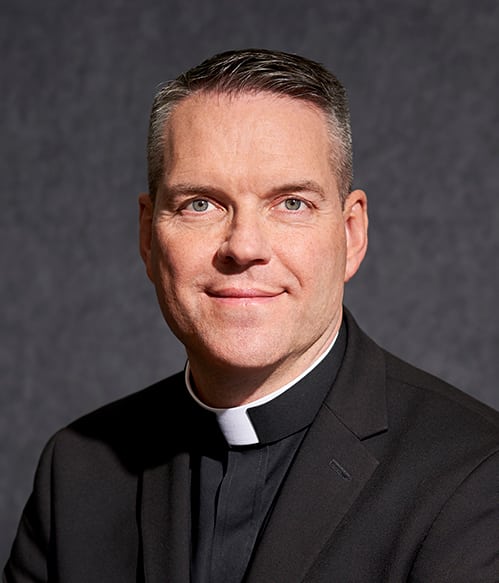Saint Mary's Newsroom
Campus ConnectionAn update from the president to alumni and parents
Preparing for your return to campus
As we continue to prepare for the academic year, you’re encouraged to begin the daily practices we are requiring throughout the fall semester. It is important these practices become routine. The university strongly recommends all members of the campus community begin taking the following daily steps at least 10 days, if not sooner, prior to returning to campus:
- Take your temperature and be sure to test less than 100.4 F.
- Wash your hands thoroughly and with regularity throughout the day.
- Wear a mask in all indoor public spaces.
- Practice personal distancing of at least six feet or more when interacting with others.
- Avoid personal interactions with others when without a face covering.
- Monitor key symptoms (e.g., fever or chills, cough, shortness of breath or difficulty breathing, fatigue, muscle or body aches, headache, new loss of taste or smell, sore throat) and act accordingly.
Answers to your questions
Why is there a fee for students who want to use the Alverna Center to quarantine before coming to campus?
The $500 fee for quarantining covers 14 days worth of meals for early arrival students, prior to the meal plan beginning. The university will not profit off of this fee and will actually lose money.
Will students be assigned a move-in date and time? When will that information be sent?
Yes; the move-in plan will be released before the end of July. If the assigned time absolutely does not work, contact reslife@smumn.edu.
Will students from out of state be moving in first?
Yes. Traveling distance is being taken into account when creating the move-in schedule. If your scheduled date and time absolutely does not work for you, contact reslife@smumn.edu.
Why are athletes being prioritized when it comes to testing?
We are not prioritizing athletes. Student-athletes will not be competing this fall, and because of this, they will not be permitted to move in early. Testing of athletes is mandated per NCAA and MIAC rules. Tests are also available to all students at the Wellness Center. All students are being asked to quarantine at home, and when that is not possible use Alverna, and student-athletes will also need to follow these rules.
Since the school is relying on students to quarantine at home for two weeks before school starts, what is the punishment for not quarantining and what is the school’s method of confirming students actually quarantined?
We hope students take into account their safety as well as others. This is why we formulated the pledge and are pushing out educational information and ethical obligations. We can only get through this pandemic with everyone’s cooperation. That said, we cannot mandate, but only strongly encourage.
What are the expectations for students who cannot afford to take 14 days off from work to quarantine before coming to campus? This is a reality for so many students, especially with the rising cost of tuition.
We recognize this hardship, but this decision was made to keep the larger Saint Mary’s community safe. The question becomes, how can you remain as safe as possible in your job? Is your employer requiring you to wear a mask and social distance? Some schools have increased fees because of the added expenses they are facing as a result of COVID-19. Saint Mary’s opted not to do this in order to keep costs as affordable as possible for our students.
Will the cafeteria be all you can eat as in years past?
In the main dining room, students will be able to go back for seconds if they wish. However, they will be asked to take a new disposable container with each return.
Will clubs still be meeting during the school year?
Yes. We are encouraging virtual meetings whenever possible and to follow social distancing guidelines and wear masks when meeting in person. Club sports and contact intramurals are suspended until January 2021 following the lead of the MIAC and its decision regarding fall sports. Affected club sport leaders have been contacted, and club sports will be able to meet in the fall to prepare for their future seasons and have structured practice. Intramurals will continue with competitions that adhere to social distancing guidelines, e.g., video gaming and Frisbee golf.
Will Zumba Club be allowed to use the dance studio in Gostomski Fieldhouse for weekly classes?
At this time, the dance studio will continue to be used for activities like Zumba with safety guidelines in place. Face masks may be temporarily removed during physical activities, athletic practices, athletic events, or classes that require exercise, provided social distancing is always maintained. We are also working to determine the occupancy rate of the dance studio.
What will the fall semester look like? Will we stay on campus until Thanksgiving break and finish the semester at home? Also, what will be done for second semester?
Yes, the goal is to keep students on campus as much as possible until Thanksgiving break, when they may finish up their semester finals. At this time, we can’t predict what spring will look like, but we will remain in communication with students.
When is the ice going in the arena?
We understand the importance of having ice for practice and conditioning. At the moment, the plan is to put the ice in Oct. 15. However, that date could fluctuate as we work with the ice rink manager and others to identify the plan for social distancing of this space. Outside rentals have been canceled until January 2021. The MIAC did not make a decision on winter sports, so we are moving forward with plans for competition and an exciting hockey season.
Will water fountains, specifically the bottle-filling ones, still be available for student use?
Yes, the bottle filler will be working but we are asking everyone to use clean containers and not to drink directly from the fountain. (Signs will also indicate this information on each water fountain.)
It was stated the “Department of Fine/Performing Arts is moving forward with all offerings as planned.” Does that mean everyone in choir will have to wear a mask? What about band, where wearing a mask is not possible? What is the plan to keep band members safe?
All ensembles will take place this fall with certain adjustments. Singers in choir will use a mask. Instrumental members will also use a mask but with slight adjustments. For example, some instruments will use an air flap (flutes), while others will keep a mask on their chin while playing and bring it up when not playing. All musicians for all groups will observe social distancing with large groups rehearsing in small numbers. However, keep in mind things are changing daily and Saint Mary’s is following the guidance of the Minnesota Department of Health with regard to music instruction.
I have an off-campus job that requires me to travel to La Crosse every Tuesday. Would I need to fill out the travel notification form every week?
Please fill out the travel notification form once and share your work schedule with us once. We’ll then have this information, so you won’t need to fill it out multiple times.
What will the guidelines for students who live or work off campus be when they come to campus for athletics, academics and on campus social situations in the residence halls?
Room 14 in the Toner Student Center will be designated space for commuter students to study, lounge, and eat. Commuter students will also be able to access other areas including the Gostomski Fieldhouse, library, and food service if they have a meal plan. Commuter students are expected to quarantine if family members or roommates become ill with COVID-19. If this happens, students should contact Student Success at studentsuccess@smumn.edu for details on how they can safely continue their studies during this time period.
What is the probability school will end up being online in the fall?
Unfortunately, we cannot predict this probability. We continue to take directive from local, state, and national guidelines. We recognize how valuable in-person education is, and we’re making every effort to continue it as long as possible. We’ve also rearranged the schedule so the danger of outside contamination during break doesn’t happen. Should we need to move online, our faculty are prepared and engaging in added training to make it the best experience possible.
Have an additional question or concern? Fill out the form and let us know.
Facility changes and enhancements
During recent months, the university has implemented a number of changes or new practices to increase the safety of our environments for students, faculty, and staff across all campuses.
Cleaning, sanitation, and social distancing
- The Maintenance Department on all three campuses have verified the cleaning supplies being utilized on our campuses are approved by the Centers for Disease Control and Prevention (CDC) and the Minnesota Department of Health (MDH) as effective in sanitizing surfaces and killing the coronavirus.
- The Maintenance Department has been working with our consultants to review and revise, where necessary, cleaning protocols and practices.
- COVID-19 related signage is being installed across the campuses.
- Disposable masks are being made available on each campus if someone should arrive on campus without one.
Classrooms, conference rooms, break rooms, lounges, and dining areas are being reset according to social distancing guidelines from the CDC and MDH. - The university has increased the number of hand sanitizer dispensers, and more are being installed throughout the university as they arrive.
- Spray bottles with cleaning supplies, paper towels, and cleaning directions are being placed across the campuses to allow people to wipe down any surface if they wish to have additional cleaning between the regularly planned cleaning.
- Plexiglas and other types of dividers have been installed to provide protection for all members of the Saint Mary’s Community and our guests. The process continues of reviewing areas and adding protection or separations as we finalize preparation for the return of the remainder of our staff, faculty, and students.
- There have been reviews of library facilities, admission offices, large gathering spaces, athletic and weight training facilities, conference rooms, laboratories, and general office locations. Individuals and groups have been relocated. Some office areas have been reconfigured and dividers added. Work continues on these and other locations.
Air exchange
- We are monitoring and implementing recommendations of the CDC, MDH, Association of Educational Facilities Professionals (APPA), and American Society of Heating, Refrigerating, and Air Conditioning Engineers (ASHRAE). The Maintenance Department has revised the rate of air exchanges in buildings on each campus; more fresh air is being introduced into our buildings and the amount of air being exhausted from the buildings has also increased throughout the day.
- ASHRAE and the Departments of Energy (on the national and state level) set guidelines for air flow, exchanges, and introduction of new air. Prior to COVID-19, energy efficiency was one of the key determinants of the optimal levels to operate air exchangers during the day. Obviously, energy efficiency guidelines have been suspended and now the focus is maximizing the amount of air exchanged in buildings and offices, the amount of fresh air introduced into a building and the exchange rate of the air.
- Some specific examples of changes: On our Twin Cities Campus, all of the air exchangers were changed from cycling during the day to a setting of continuous airflow throughout the operational day. We have increased the amount of outside air introduced into the buildings. On the Winona Campus, all air exchangers have been adjusted to increase airflow, increase the introduction of outside air and increase the air exchange rate.
- There has been a review of all air filters, and they were upgraded as necessary.
‘Living Liturgy 2020’ recognized by Catholic Press Association Awards

Dr. Brian Schmisek
Living Liturgy 2020, a book co-authored by Brian Schmisek, Ph.D., provost and dean of faculties, was recognized by the Catholic Press Association Awards, winning third place in the category “Liturgy – soft cover.” This book is featured in the 2020 Book Awards Gallery, which is searchable by category.
Living Liturgy™ is a comprehensive go-to guide for preparing Sunday liturgy. This 2020 edition provides completely new content from an engaging team of expert authors. It provides practical, sound, and inspiring preparation for parish ministry.
Integrating daily living, prayer, and study into one inviting and easy-to-use resource, Living Liturgy™ is an indispensable guide that deepens and strengthens the worship experience for the whole parish. It includes featured liturgical texts, supports for ministry, and utility features.
This best-selling annual resource is ideal for parish ministers, liturgists, pastors, planning committees, and RCIA programs. It offers the week’s Sunday readings, plus insightful reflections and background for parish ministers of all types. Engaging new art by three remarkable artists complements the text. Written completely fresh each liturgical year, Living Liturgy™ gives team members the spiritual preparation they need to become true ministers of the liturgy.
Suzanne Shatila named to CSWE council

Suzanne Shatila
Suzanne Shatila, director of the Master of Social Work program, has been appointed a member of the Council of Social Work Education (CSWE) on the Role and Status of Women in Social Work Education.
The council is part of the CSWE’s Commission on Diversity and Social and Economic Justice, responsible for developing educational resources relevant to women’s issues within social work education. The council works to eliminate all procedures within academia that hinder the full participation of women, makes recommendations to the board of directors on policy, and coordinates programs and activities related to women in social work education.

Heukeshoven, Concert Band receive prestigious recognition
Janet Heukeshoven, D.M.A., music professor, and the Saint Mary’s University Concert Band have been named national finalists for The American Prize, the Ernst Bacon Memorial Award for the Performance of American Music, College/University ensemble division, for 2019-2020. The award honors the band’s performance of the university’s past two Kaplan Commission works, “Nigun Prophecy” by David Ashalomov and “Ayshet Chayil (A Woman of Valor)” by Steven L. Rosenhaus.
The prestigious award recognizes and rewards the best performances of American music by ensembles and individual artists worldwide, based on submitted recordings. Focused exclusively on works by American composers from any period and in any style, the contest not only judges performances, but in the case of new or unfamiliar works, the music itself. The announcement is expected next week.
The Helen and Sam Kaplan Foundation gave Saint Mary’s a significant philanthropic gift more than 20 years ago for the purpose of building a Jewish-Christian dialogue and providing means for students to directly interact with Jewish religion and culture. Commissioned work is typically based on Jewish melodic material, either folk or religious sources.
Photo caption: Janet Heukeshoven, D.M.A., and the Concert Band with the 2019 Kaplan composer, David Ashalomov.

Saint Mary’s University of Minnesota responds to MIAC decision on fall athletics
WINONA, Minn. — The Minnesota Intercollegiate Athletic Council announced its decision today, Tuesday, July 28, to postpone most fall intercollegiate competition. According to the MIAC, “The conference is working to develop spring schedules for those sports, which have been deemed at medium- or high-risk for coronavirus transmission by the NCAA.” The postponement relates to health and safety concerns related to the COVID-19 pandemic.
The MIAC is permitting golf and tennis to compete this fall in accordance with campus, state, and NCAA health directives. Saint Mary’s does not have a golf team, and although Cardinal tennis teams will practice in fall, no conference games are scheduled until spring.
“We know this wasn’t an easy decision for the MIAC to make, but we understand this outcome because our No. 1 priority has always been our students’ safety as well,” said Dr. Tim Gossen, vice president for Student Affairs. “A considerable amount of effort was put into finding a different solution. However, we believe ultimately this decision is in the best interest of our student-athletes as well as our university as a whole. We share in the obvious disappointment of student-athletes, particularly our seniors, and we will do all we can to support them physically and emotionally. We place tremendous value on the importance of intercollegiate varsity athletics, but value the health, safety, and future well-being of those student-athletes, as well.”
Brian Sisson, athletic director, said Cardinal student-athletes will be able to practice and continue strength and conditioning programs this fall, following NCAA, MIAC, and Minnesota Department of Health (MDH) guidelines. “We’re committed to promoting ongoing engagement between our student-athletes and our coaching and support staff — outside of the competitive arena — so they can continue training and grow stronger as a team. At Saint Mary’s, we refer to our Cardinals as student-athletes because they are first and foremost students, but we also know it’s the opportunity to participate and excel in athletics that is an integral part of their college experience, and we will do our best to enhance our student-athletes’ experience.”
The NCAA, MIAC, and Saint Mary’s have not made decisions on winter and spring athletics at this time.
Meet Dr. Schissel, assistant professor in the Psy.D. in Counseling Psychology program

Dr. Ann Schissel
Ann Schissel, Ph.D., joined Saint Mary’s University as an assistant professor in the Psy.D. in Counseling Psychology program on May 1.
Outside of Saint Mary’s, Dr. Schissel is a licensed psychologist and independent contractor with CenterLife Counseling, a role she’s held since 2018. Prior to joining Saint Mary’s, she was a senior clinician (psychologist) and a course-contracted assistant professor at Hazelden Betty Ford Foundation Graduate School of Addiction Studies. Her clinical and teaching experiences are extensive.
“I have taught a fair amount at the undergraduate and master’s level, and after working with doctoral-level trainees (in the final year of their doctoral training programs) at my last job at Hazelden, I became interested in teaching at the doctoral level,” said Dr. Schissel. “I love teaching, advising, and mentoring students and look forward to growing in these areas in the Saint Mary’s community.”
Dr. Schissel holds a Ph.D. in clinical psychology from University of Minnesota and a B.A. in psychology from Columbia University. She is also a board member of the Minnesota Society for Clinical Hypnosis, member of the American Society for Clinical Hypnosis, and member of the Minnesota Psychological Association.
“My educational and teaching interests focus on psychopathology, and much of the coursework I have historically taught has been in this area. Moreover, psychological assessment measures and techniques were a focal part of my training, and I look forward to teaching coursework in that area as well,” Dr. Schissel said.
Dr. Schissel has delivered numerous presentations on topics such as suicide; therapeutic approaches to nightmares; practical skills for working with high-risk patients; system level implementation of trauma informed care; and more.
Join us in welcoming Dr. Schissel!
Important information on quarantine
The university is strongly encouraging all students to quarantine at home for 14 days prior to their return to campus in August. The university expects students from the states of Arizona, California, Florida, and Texas to quarantine at home for 14 days prior to their return to campus in August. If you are a student from one of these states and are unable to quarantine at home, you may request to quarantine on campus, but there will be fees associated with this option. You would not be moving into your fall housing assignment. If needed, please contact reslife@smumn.edu.
Quarantine is used to keep someone who might have been exposed to COVID-19 away from others. Quarantining helps prevent the virus from spreading, particularly before a person who is infected with the virus knows they are sick or if they are infected with the virus but are asymptomatic. People in quarantine should stay home, separate themselves from others, and monitor their health. The goal of this effort is to reduce the number of individuals with whom you have contact prior to returning to campus.



